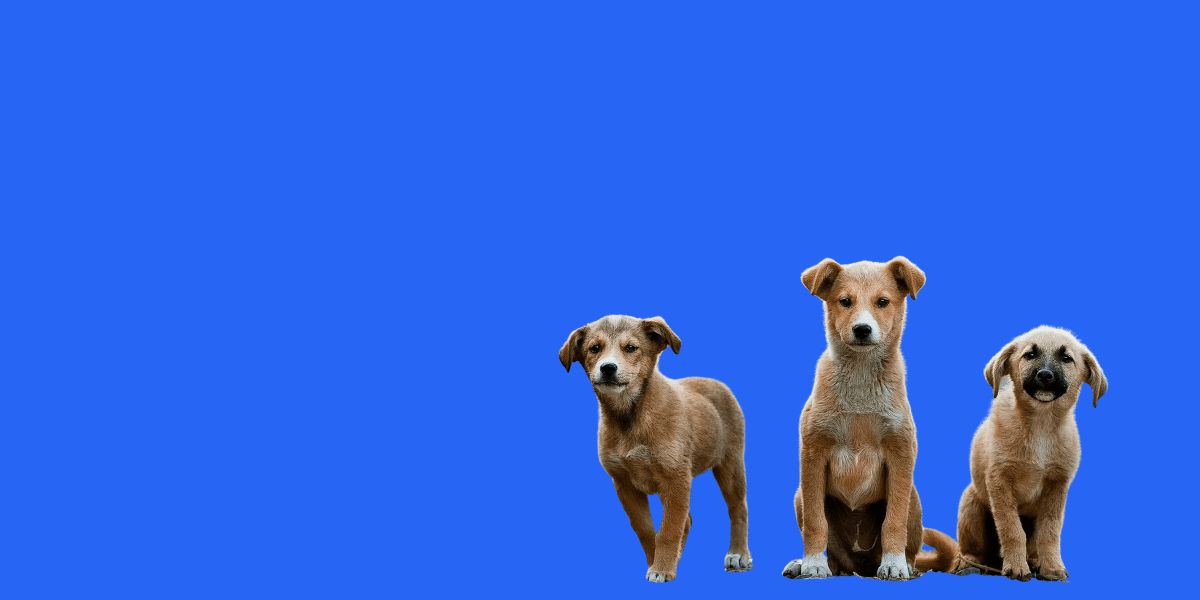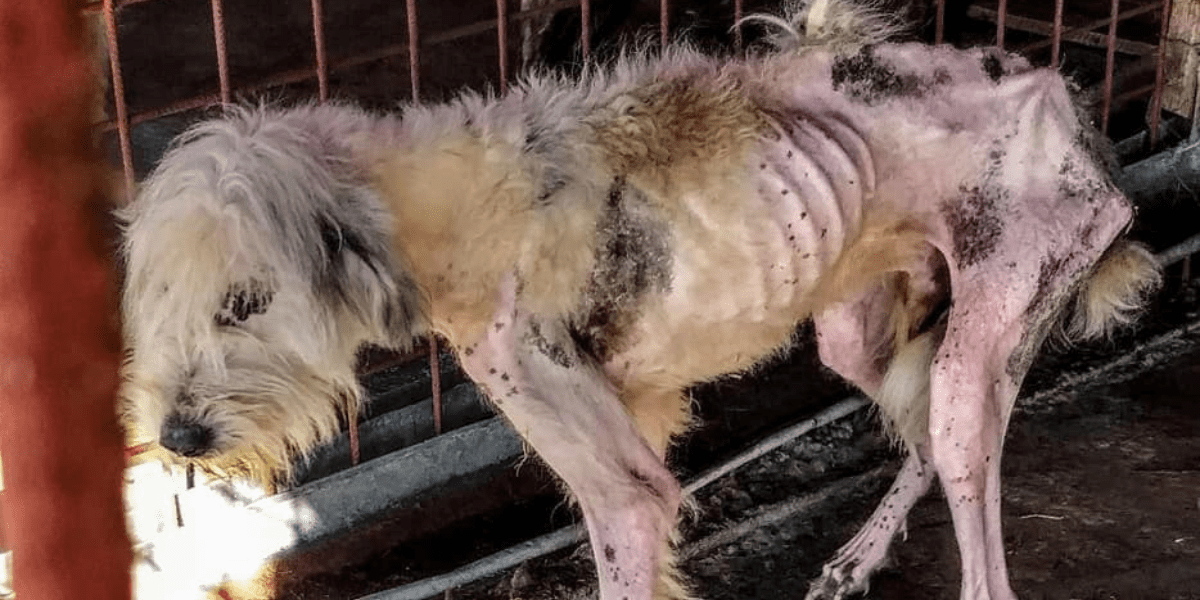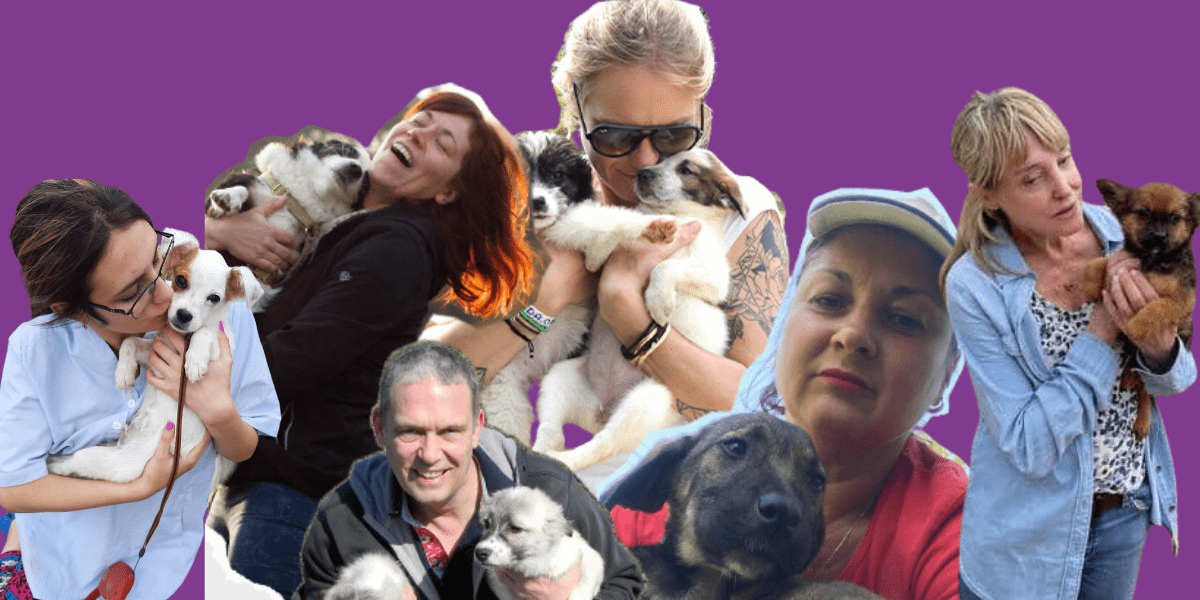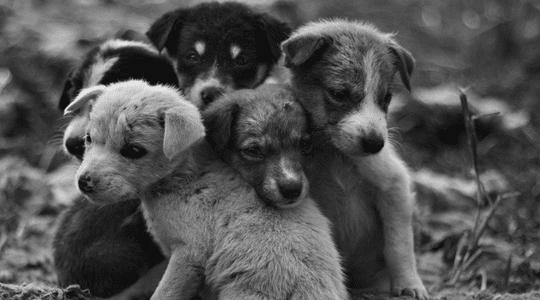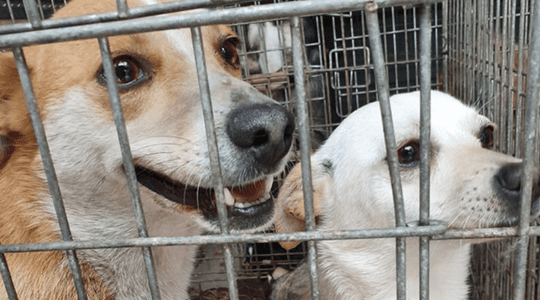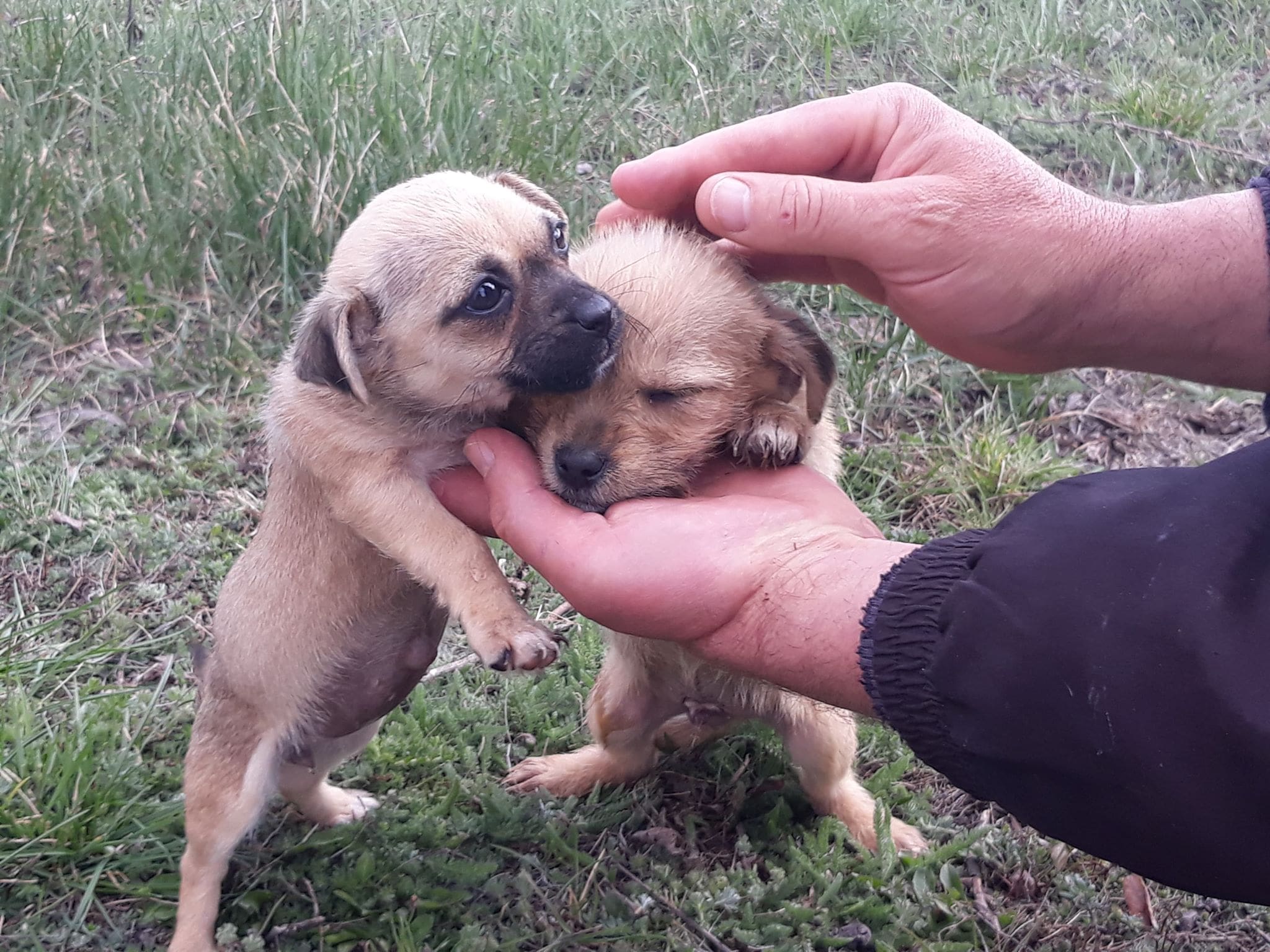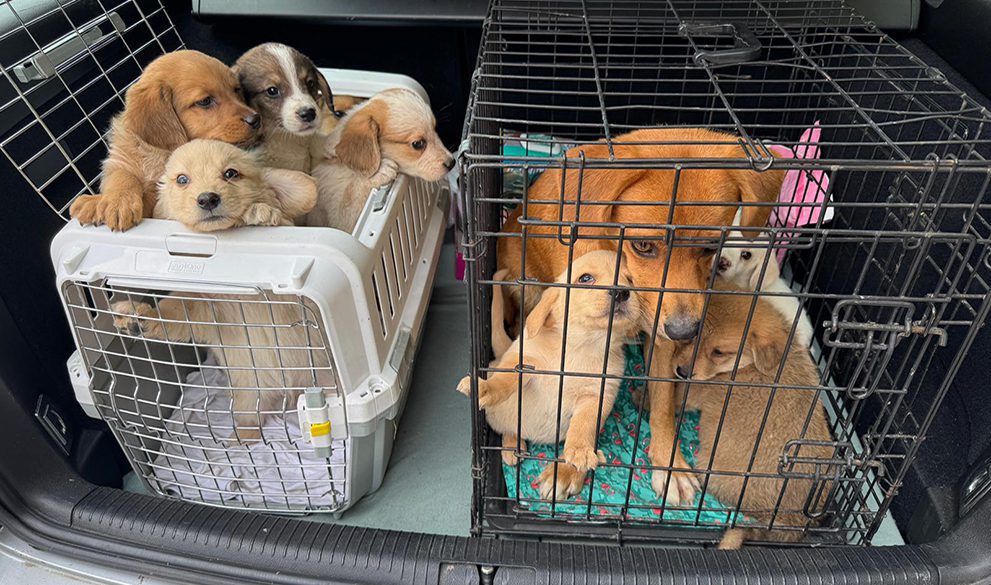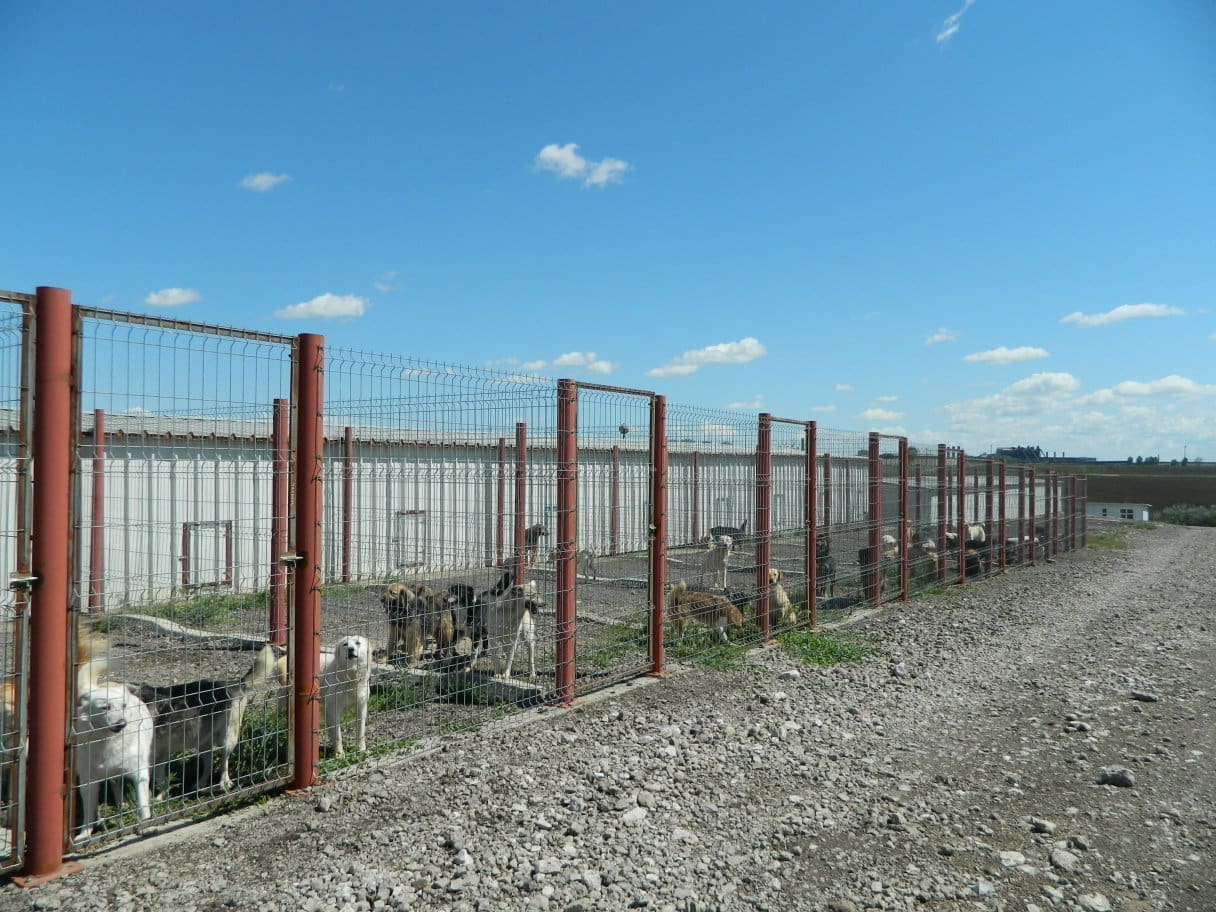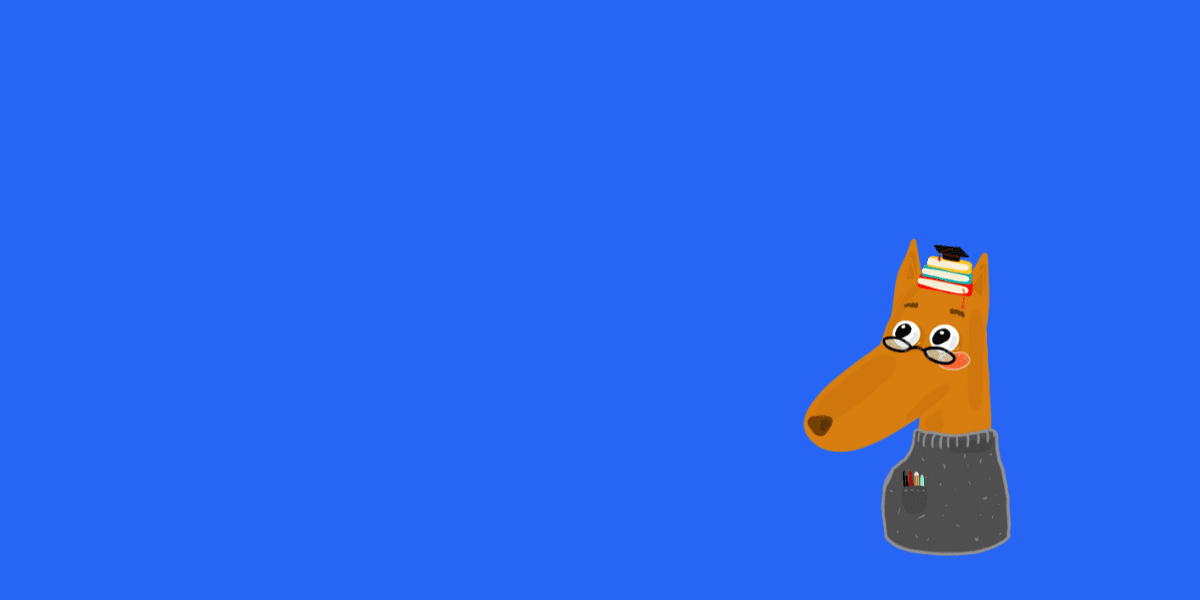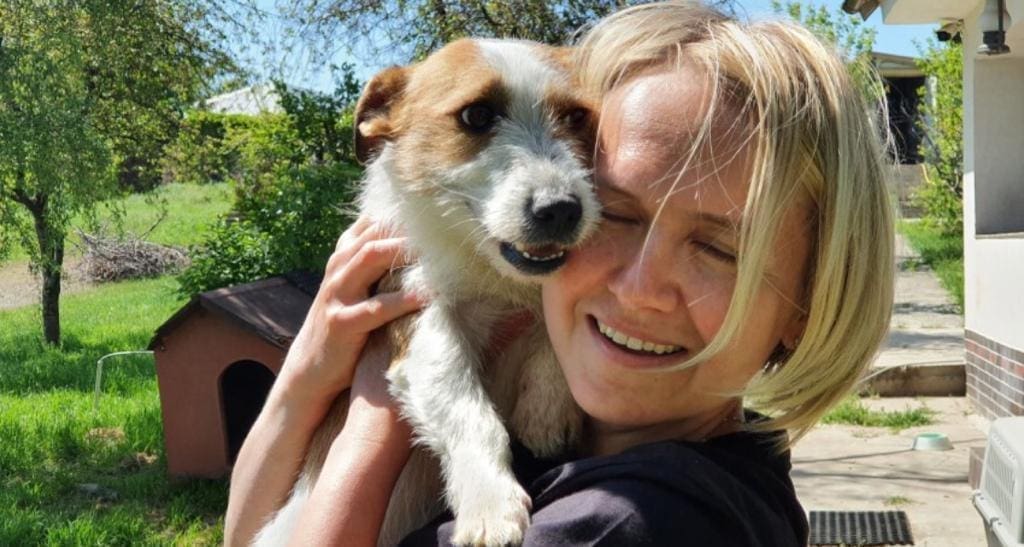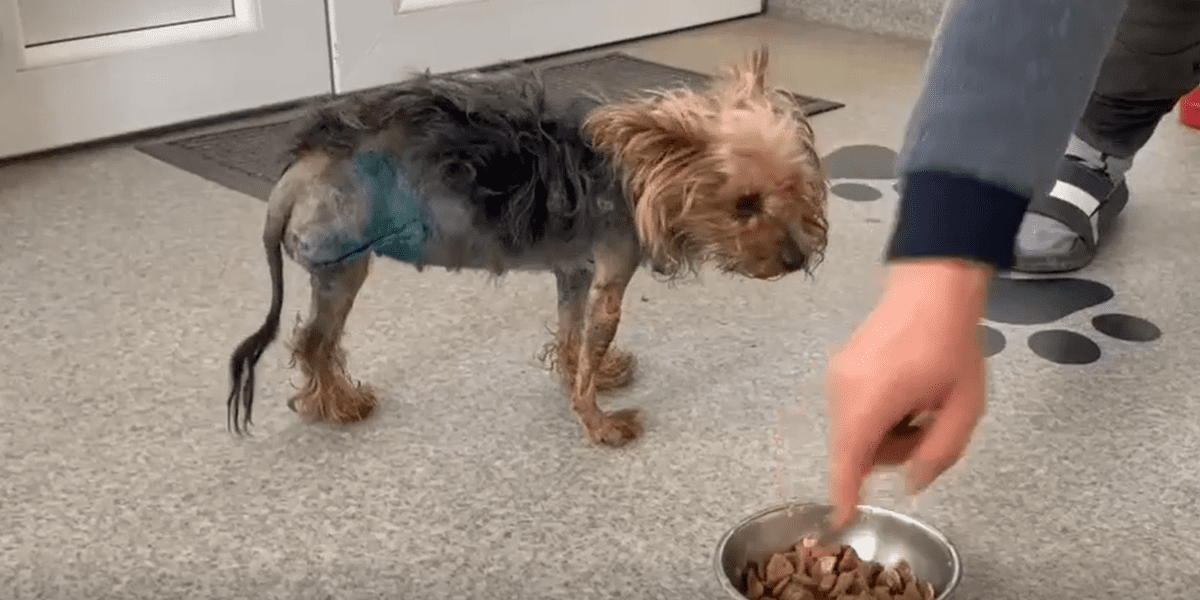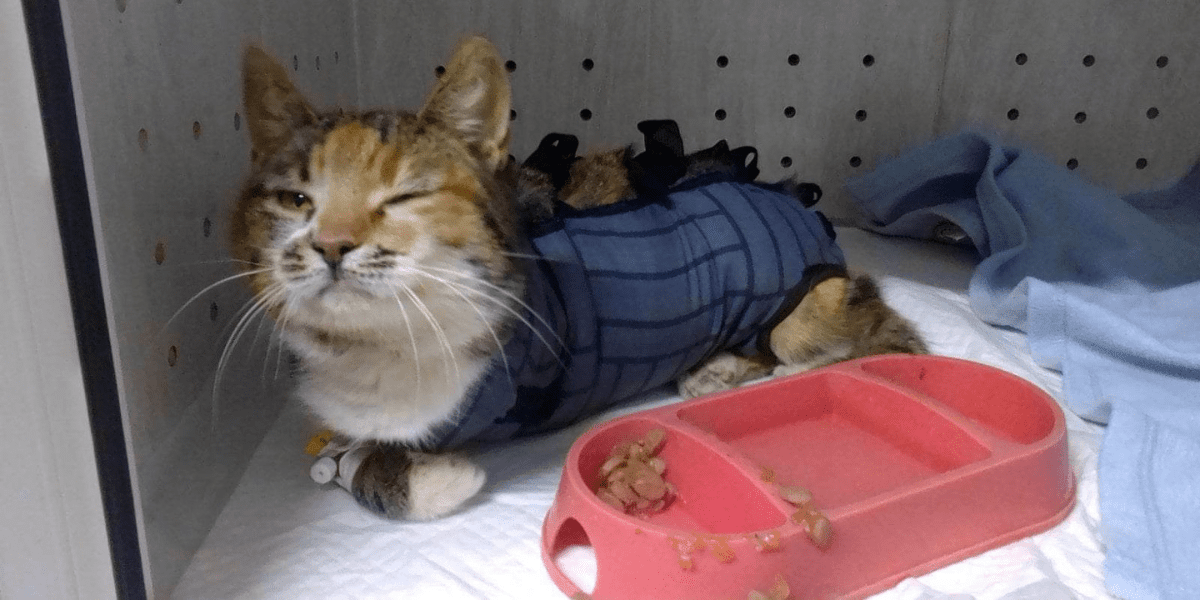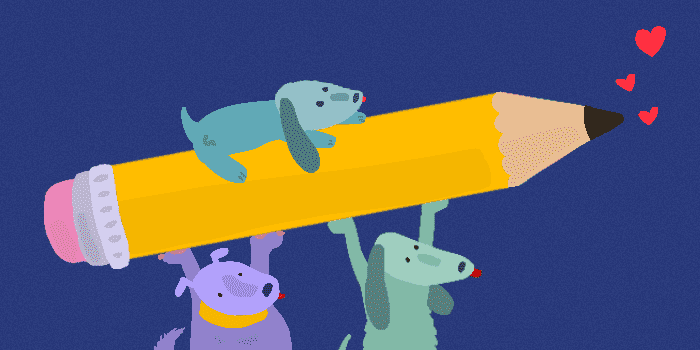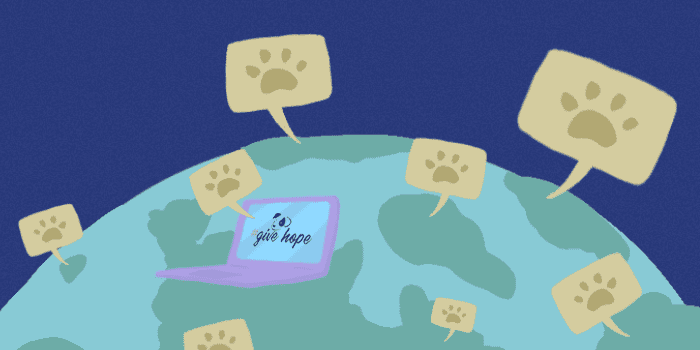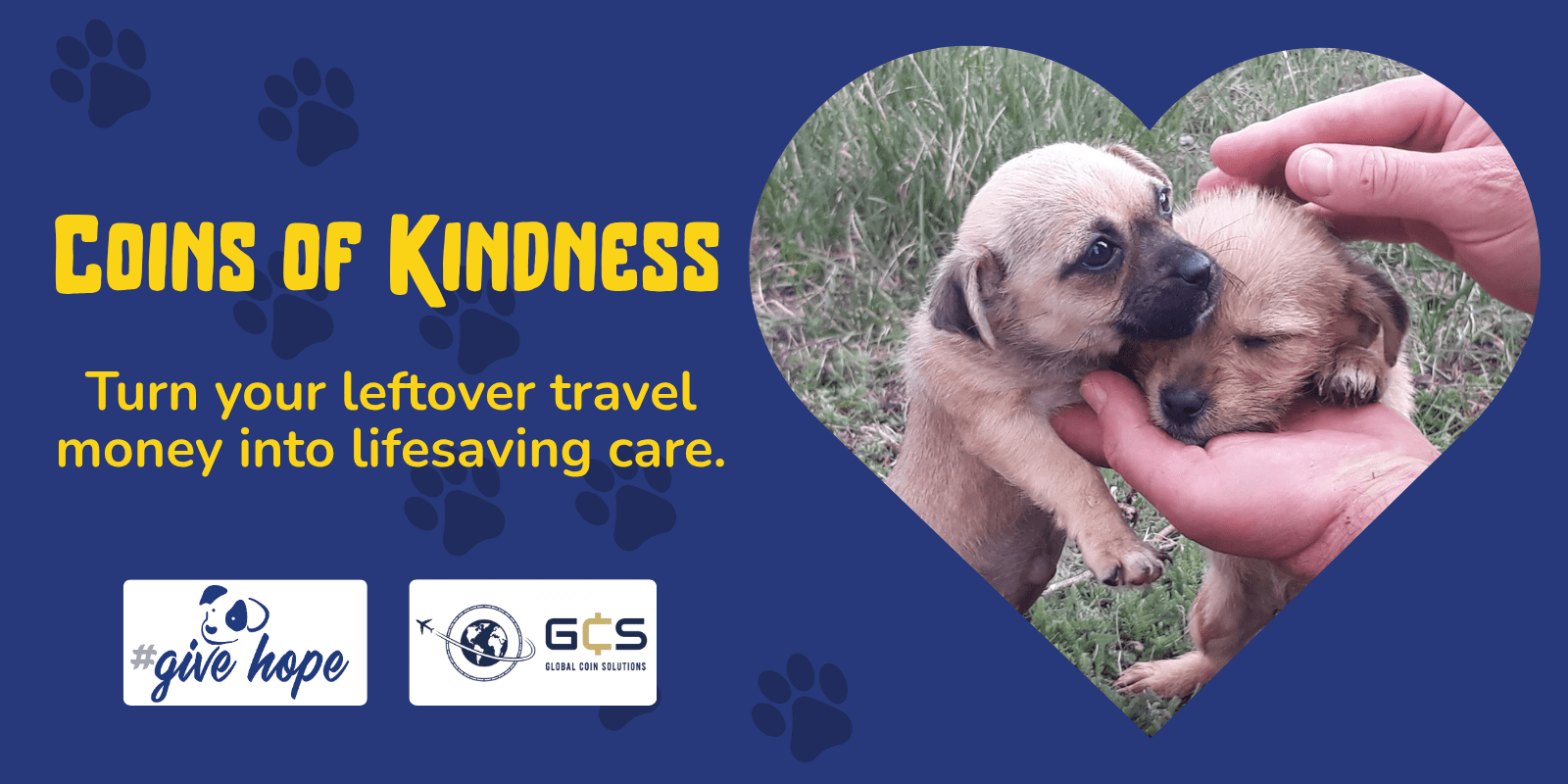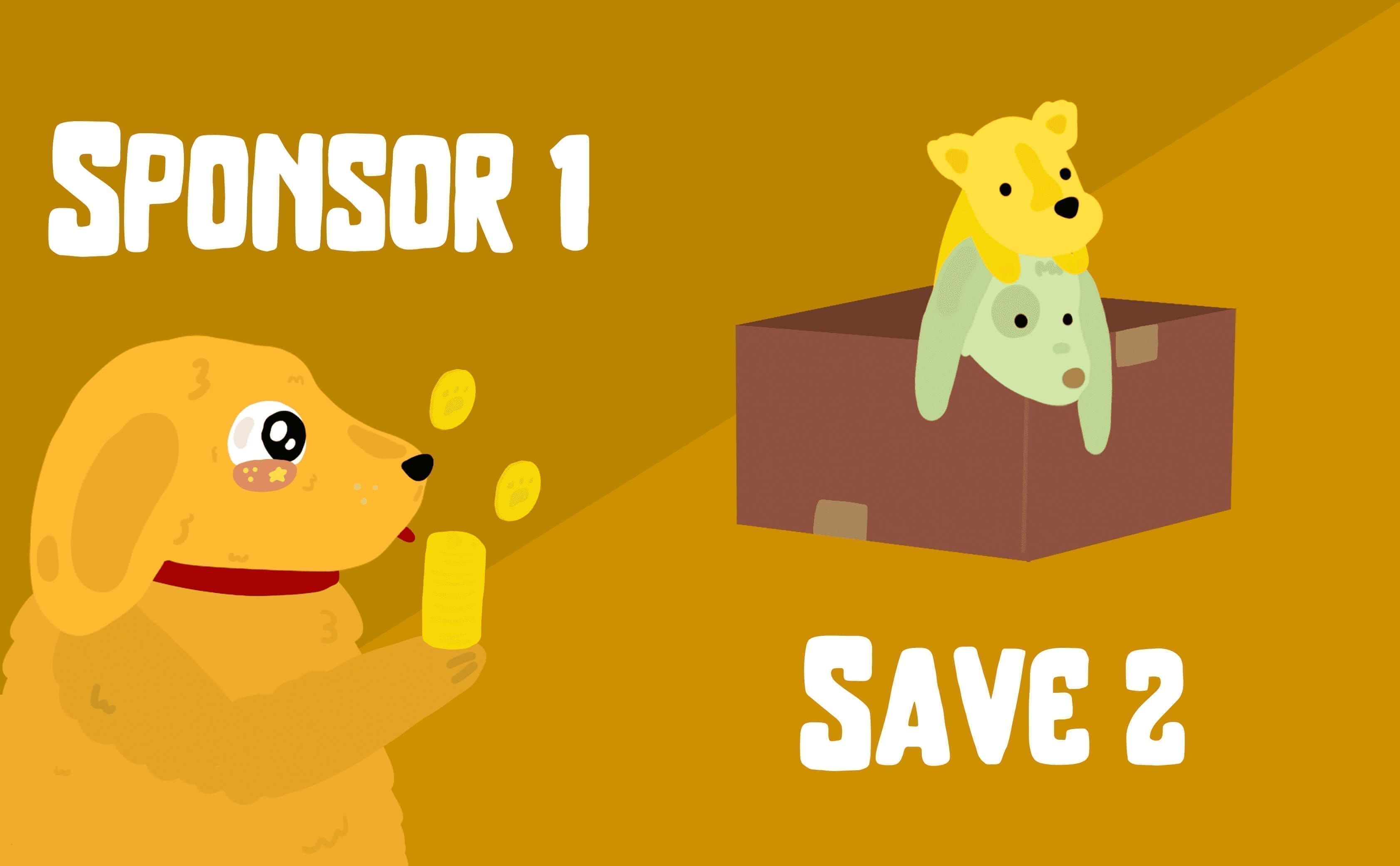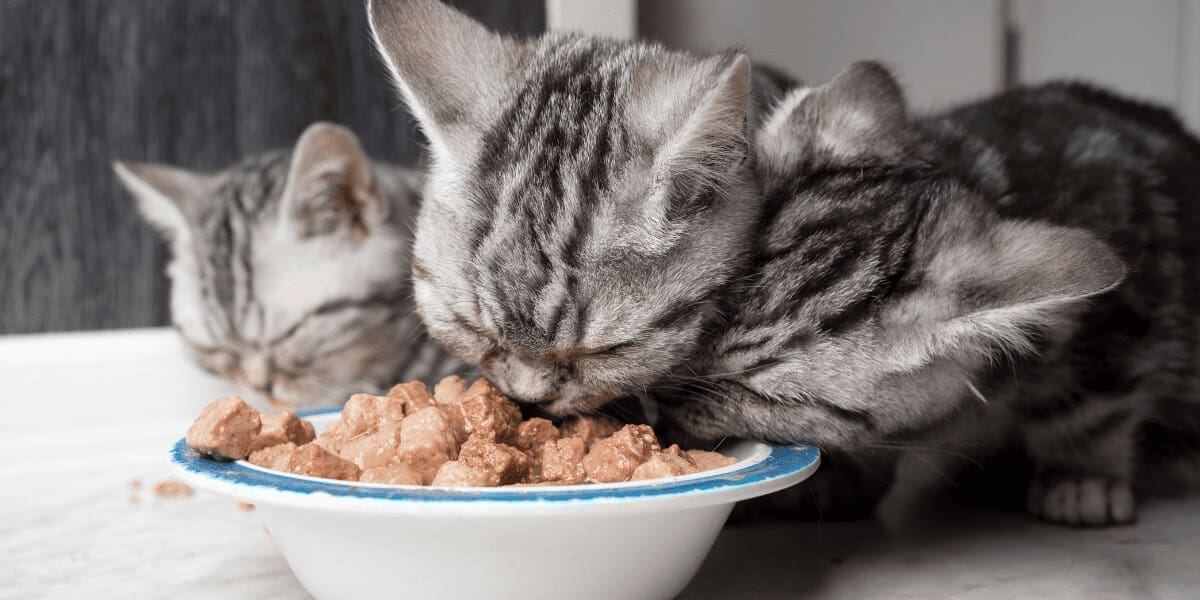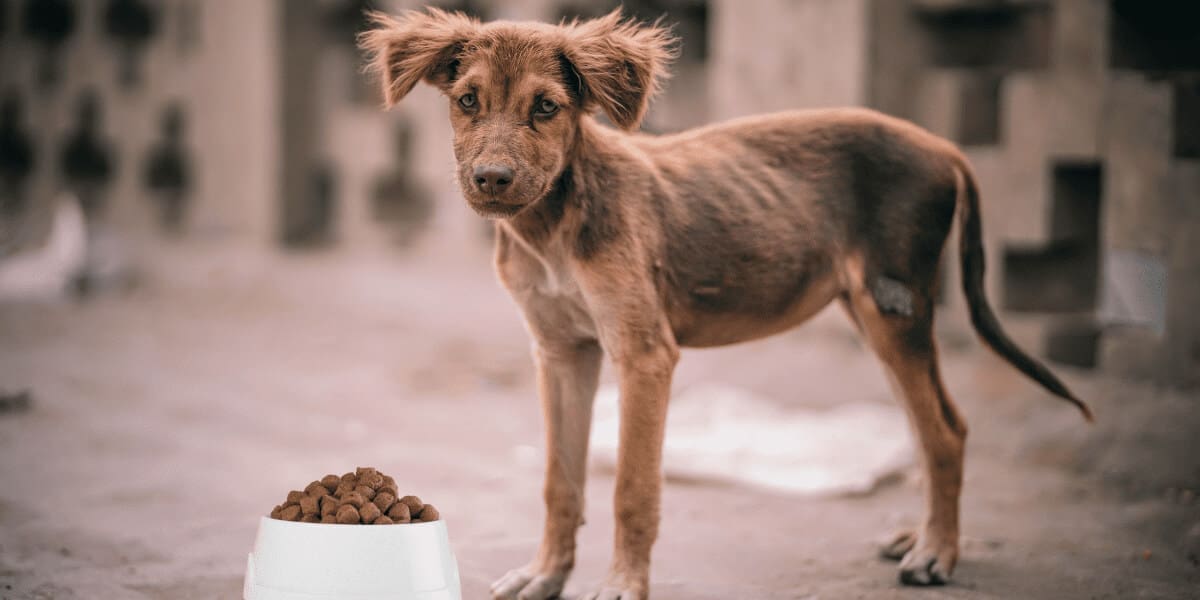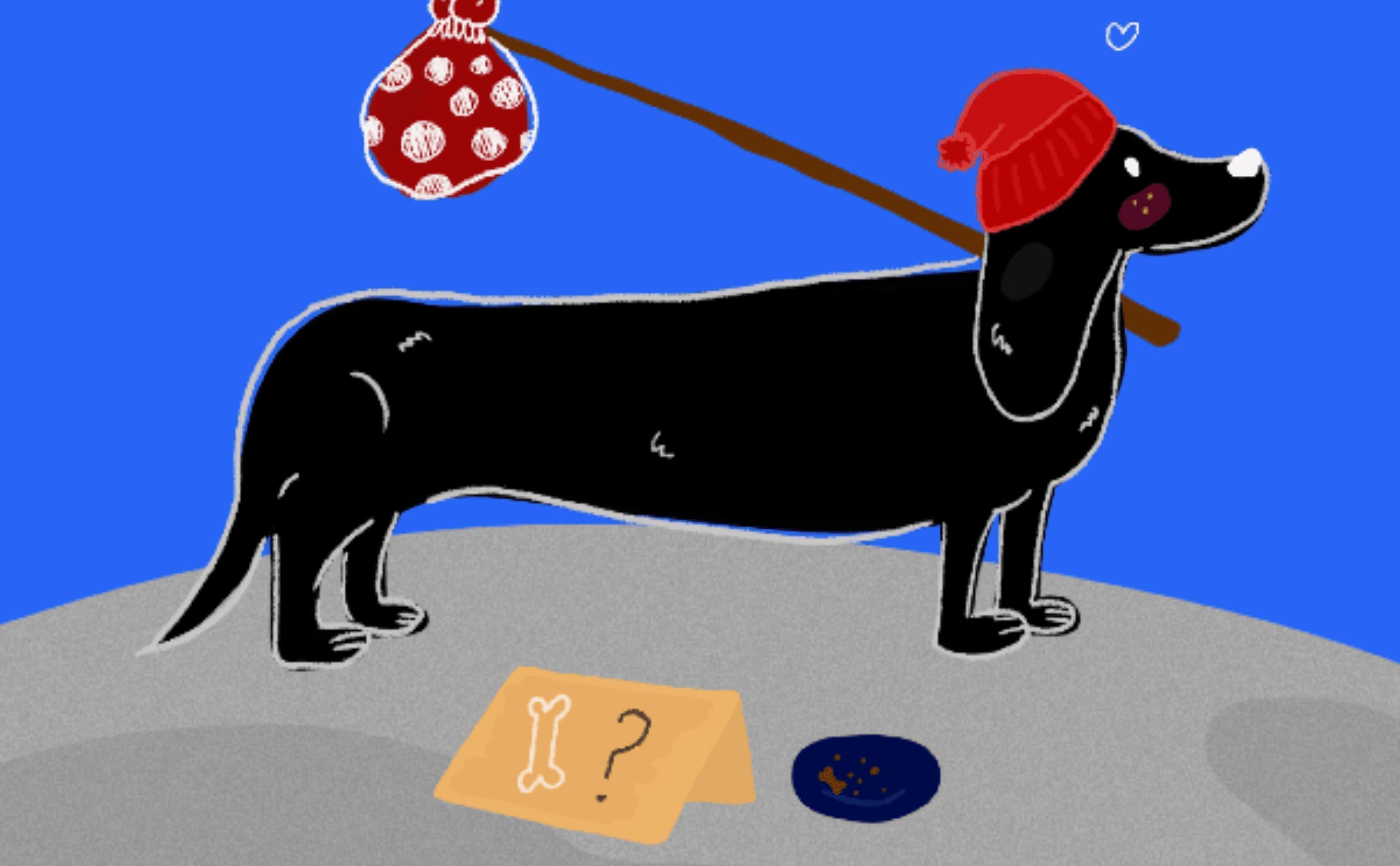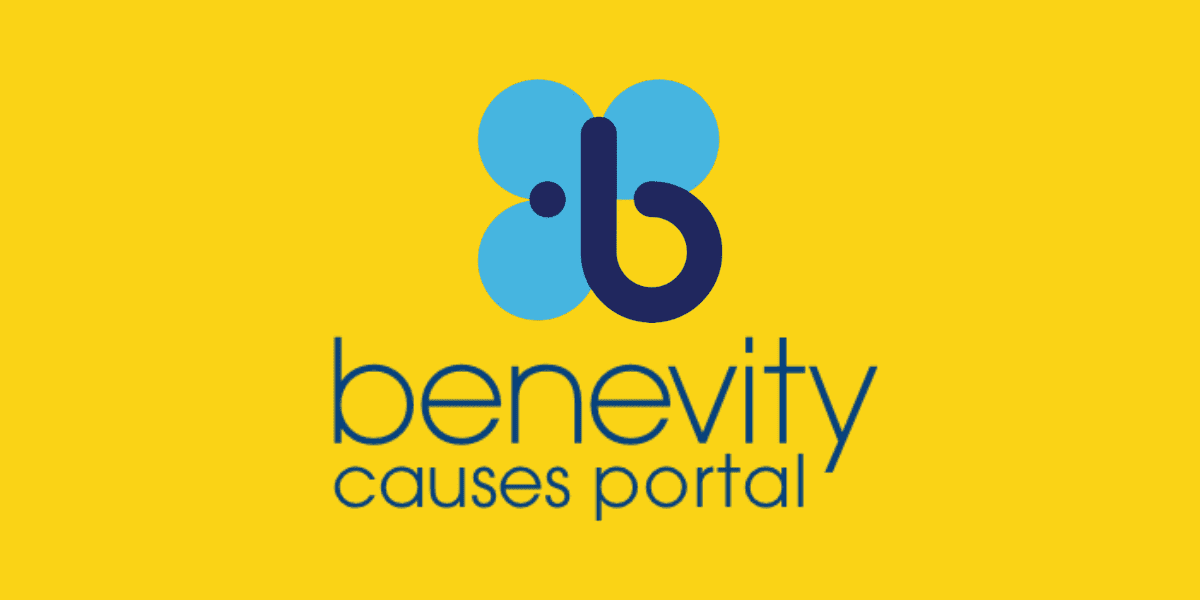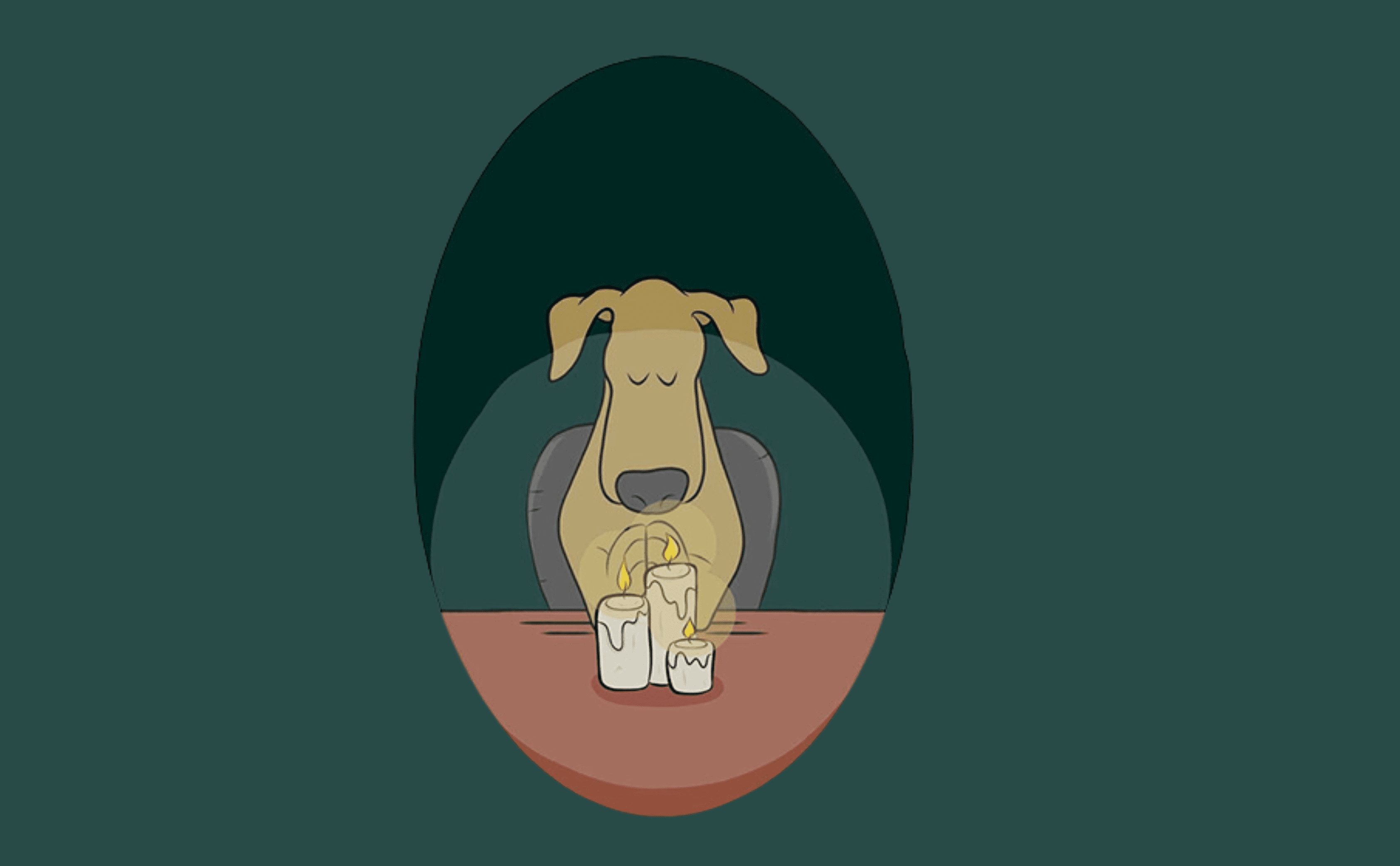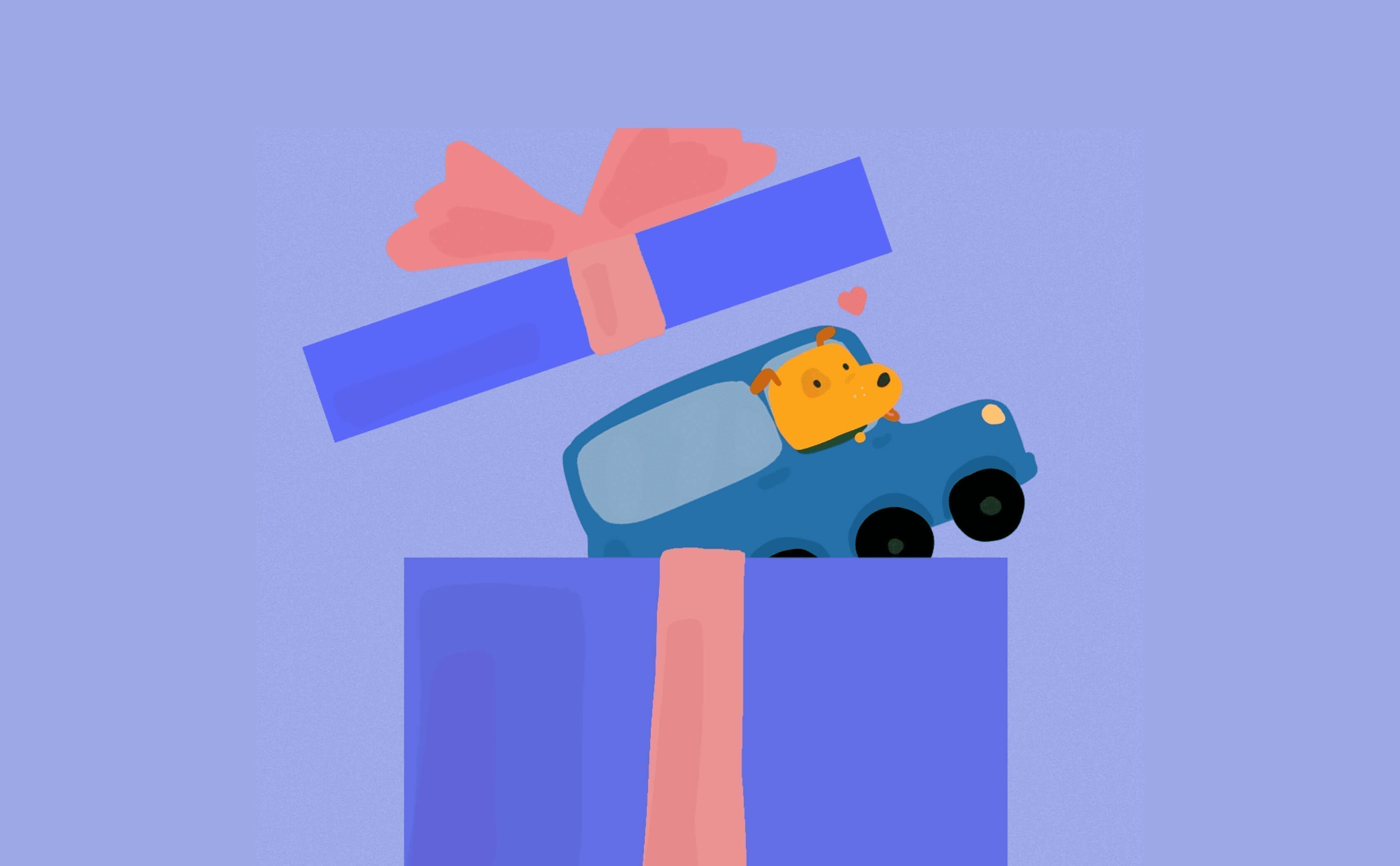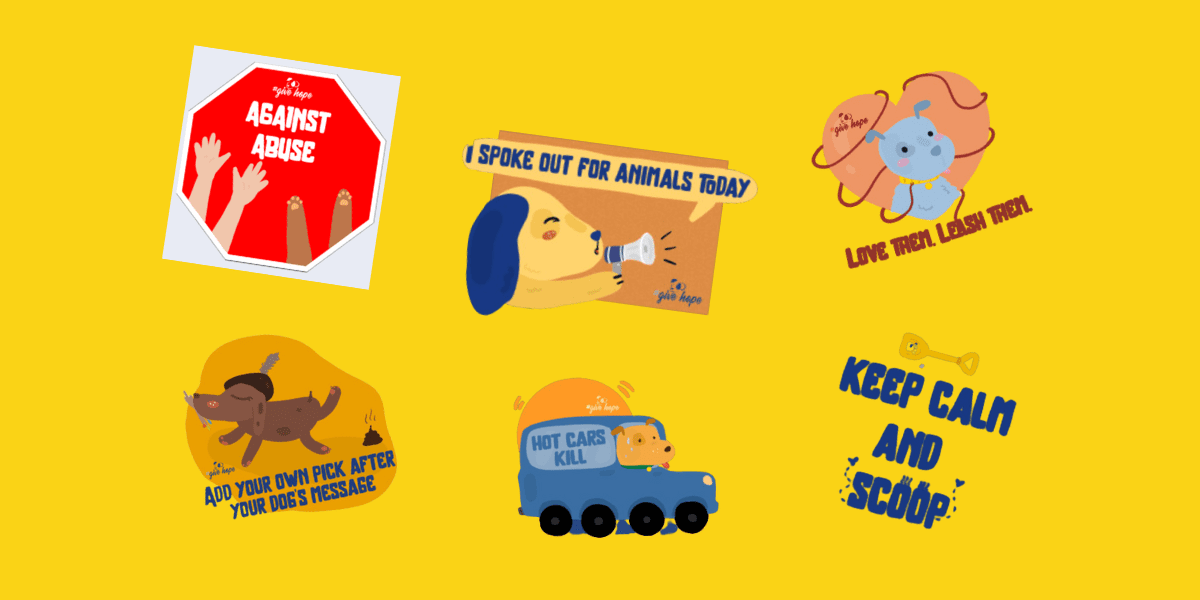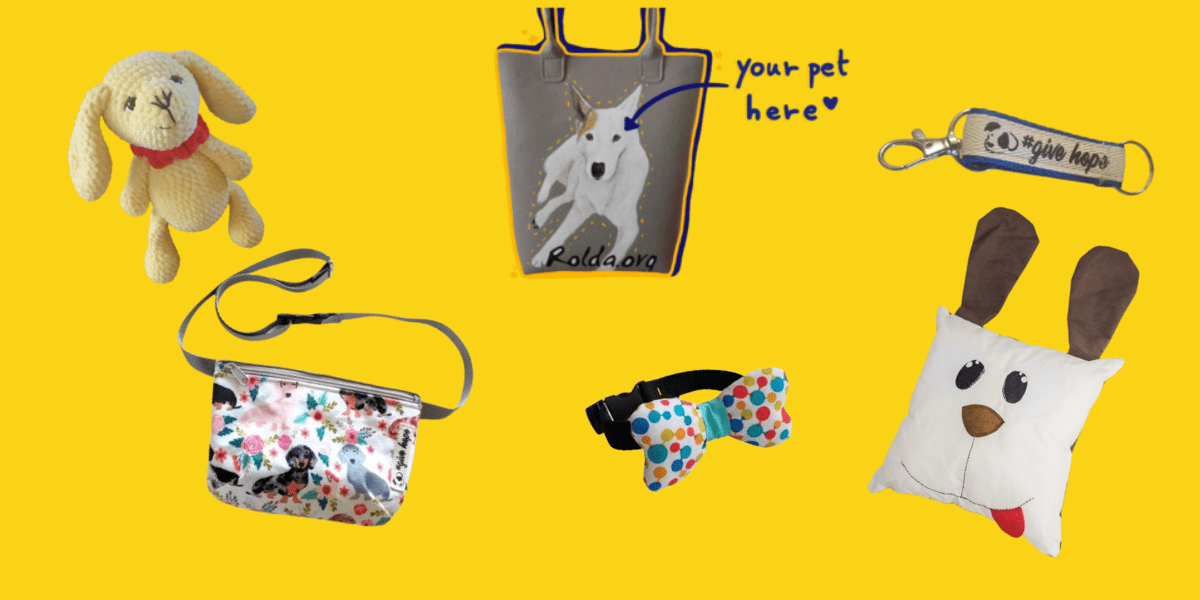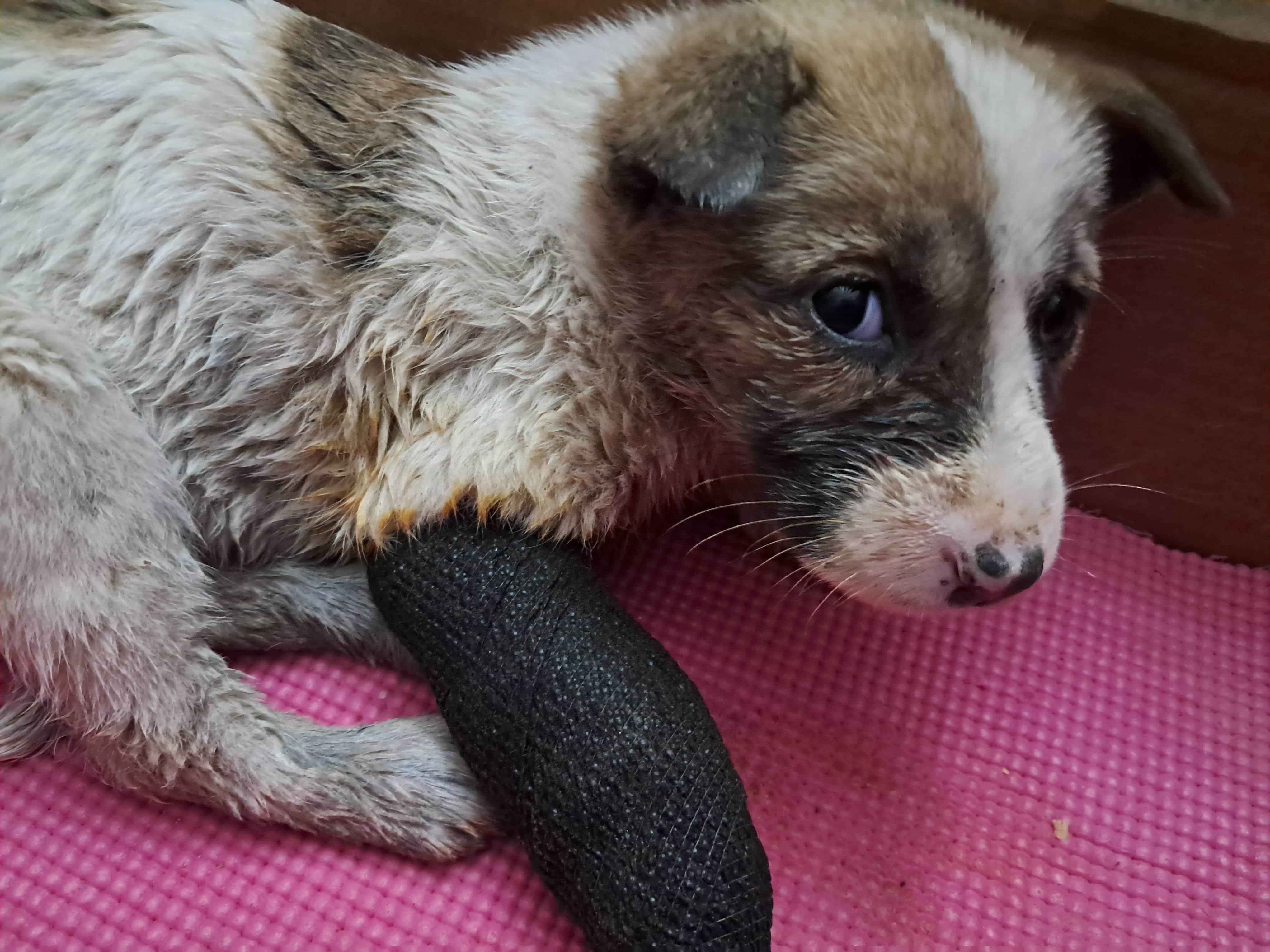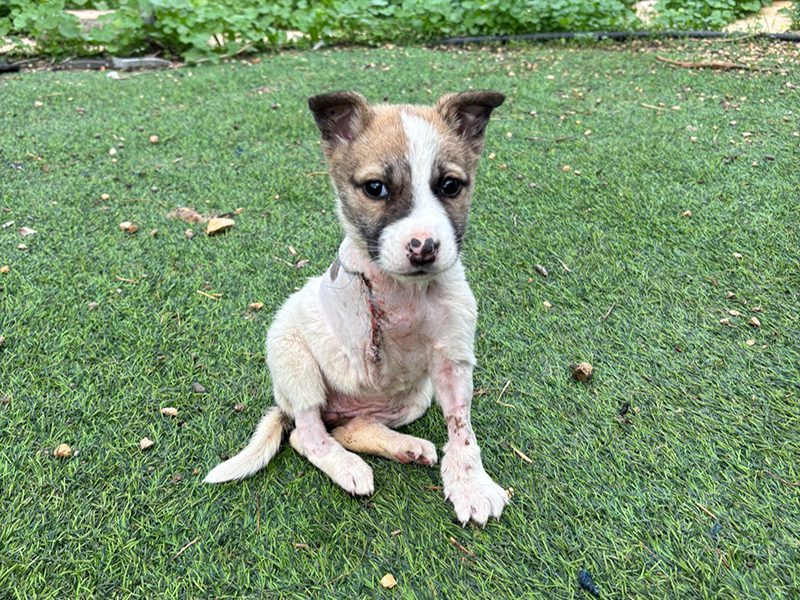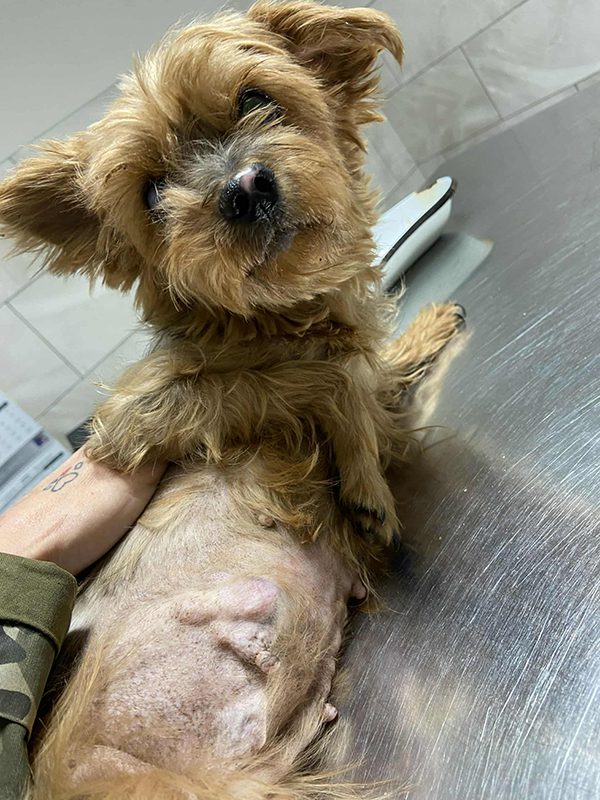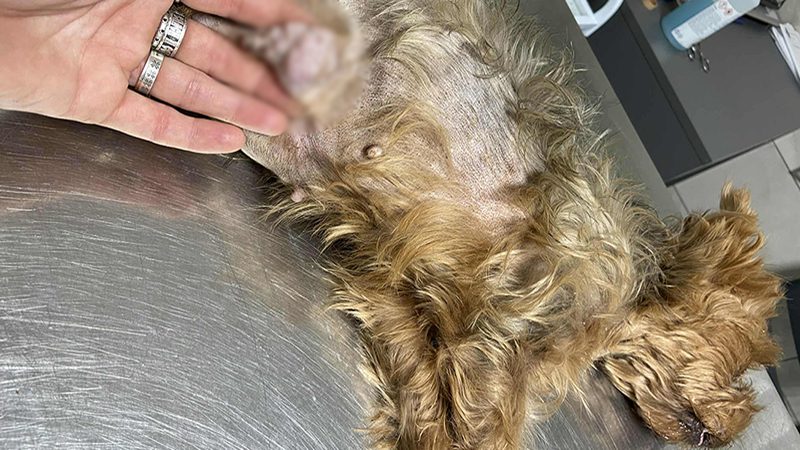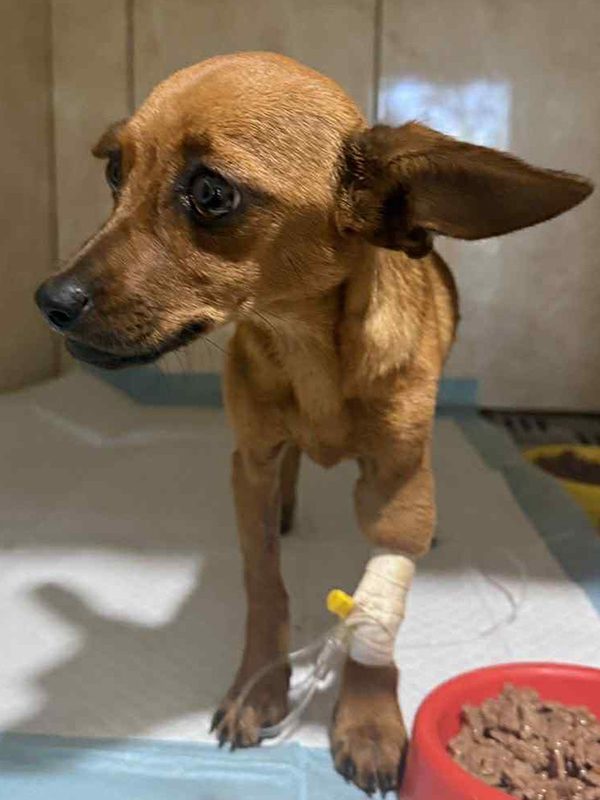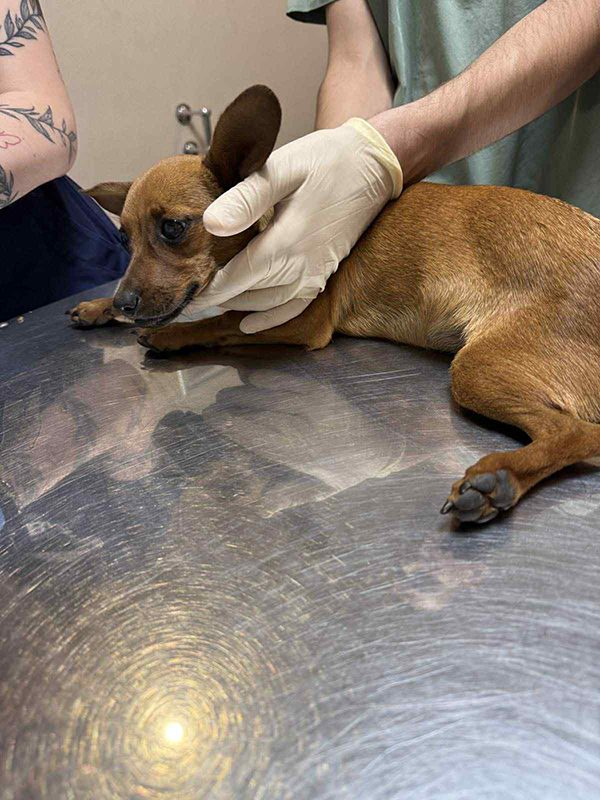Each day brings new challenges, and each day, hope rises as another innocent life is given a second chance. Some stories, though, touch our hearts more deeply than others.
When one of our ROLDA Rescue Heroes received an urgent call, it was about a tiny soul fighting to survive in the shadows of Bethlehem, unnoticed by the small, uncaring world around him. The only world he had known until then.
Alone and silent on the side of the road, this puppy was wracked with pain from a terrible injury that left his paw severely swollen and infected. It was a situation no creature, let alone a puppy, should ever have to endure. We may never know what cruelty or accident led him here, but we do know his suffering was immense, and his spirit was unbroken.
With hope as his companion, he was rushed to the veterinary clinic, where every second counted.
The compassionate vets fought valiantly to save his tiny paw, refusing to give up on this brave little one. But sometimes, love means making the hardest decisions.
The damage was too severe. Infection threatened his life, and there was only one way to give him a future. His paw had to be amputated—a heartbreaking choice, but one that offered hope instead of despair.
That day, heartbreak and hope walked hand in hand. The choice that broke our hearts also opened the door to his future. A brighter future.
Today, this little hero is recovering, wrapped in warmth, care, and love. The pain of his past is behind him, replaced by the promise of new beginnings.
He is finally free from pain, and despite all he’s endured, he inspires everyone he meets with his strength and gentle spirit. His resilience reminds us that even in our darkest moments, hope can shine through. He teaches us the power of never giving up, no matter the odds. He may walk on three legs, but his heart is whole—and every step he takes is a testament to the healing power of love.
There are so many more souls waiting for a second chance. With your kindness and support, we can keep writing stories of hope—one precious life at a time.
ROLDA Rescue Heroes in Bethlehem
ROLDA’s work has always been primarily rooted in Romania, but over the years, we’ve learned an important truth. We cannot be everywhere, and there is a lot of power in collaboration. That is why, when animals are suffering in conflict-affected areas, we choose collaboration over borders and competition. By partnering with trusted local rescuers, we are able to support animals who would otherwise be left without food, medical care, or a chance to survive.
Right now, in and around Bethlehem, dogs and cats are being abandoned, injured, and left hungry as the ongoing conflict continues. Local rescuers are doing everything they can, but clinics and shelters are overwhelmed, resources are limited, and emergencies are arriving every single day. Through our Global Emergency Program, ROLDA is working alongside a local rescue team in Bethlehem to help provide urgent food, veterinary care, life-saving medicines, and transport so animals can reach safety and treatment in time.
Please help us continue rescuing puppies like him.
Donate to support emergency surgeries and recovery care. Every rescue begins with compassion — and continues with you.
This is Alfie. This is what it looks like to be born into life as an unwanted stray.
From birth, this small black kitten sat on the streets of Tulcea, cold, hurting, and unnoticed. His eyes had, at some point, been so badly damaged that he could no longer see. So, this kitten, blind to the world, hoped for someone to notice him and show him kindness.
For days, no one did. But one of our partner animal rescue teams, The Great Catsby, sees its mission as intervening to change stories like poor Alfie’s. So, when someone called and told them about Alfie, they immediately went looking.
For three days, the team searched, fearing the worst each time the sun set without any sign of the vulnerable kitten. Were they too late?
On the fourth day, when hope was almost gone, he was finally spotted. Fragile and starving, it was clear Alfie had already endured more than any baby should. He was so malnourished that it was hard to believe the tiny kitten was already three months old. Most disturbingly, the severe damage to his eyes showed signs of prolonged suffering without care, something no animal should ever have to experience.
Upon finding him, Alfie was rushed to the vet. We refused to allow his suffering to continue any longer. The vet confirmed our fears. Neither of Alfie’s eyes could be saved, and he would face the world forever blind.
What followed was a long, difficult month of recovery, setbacks, and more pain than any kitten should know. Still, Alfie fought. Quietly. Bravely.
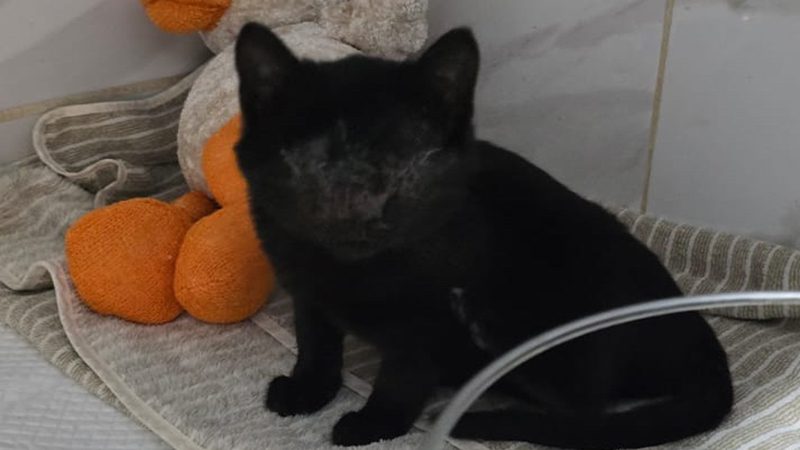
Today, Alfie is a resilient young cat who is finally friendly, calm and trusting after surviving terrible odds. Despite losing his sight, he now knows warmth, comfort, and kindness. But Alfie’s story is only one of many. Across Romania and Ukraine, there are thousands of kittens just like him. They are born on the streets, their only memories consisting of illness, hunger, cold, and cruelty. Most live unseen until it is too late.
This is why we ask for your support.
Because without care, injuries become fatal.
Without treatment, pain becomes the norm.
Without compassion, these lives simply disappear.
If Alfie’s story touched you, please consider supporting our work so that you help the next kitten in need. Your donation won’t just change one life, it gives hope to all the unseen strays still waiting for kindness.
The small terrier sat where her family had left her, waiting for them to come back. She didn’t understand why they’d walked away. She couldn’t comprehend that at ten years old, with tumors growing on her belly, she was now considered disposable.
How long did Alya wait before she realized they weren’t returning?
In Ukraine, where the ongoing war has displaced millions and shattered countless lives, abandoned pets have become an all-too-common tragedy. Some families flee and cannot take their animals. Others, facing impossible choices between survival and sentiment, leave their pets behind. But Alya’s story is different, and perhaps more heartbreaking; her owners didn’t flee danger. They simply decided an aging dog with health problems was no longer worth keeping.
When Inessa, who runs a ROLDA-sponsored shelter in Ukraine, found Alya, the physical evidence of neglect was unmistakable. The tumors on her mammary glands had grown large and painful. Her body showed the telltale signs of a dog who had spent years breeding, producing litter after litter, only to be discarded when she was no longer useful. At ten years old, Alya should have been enjoying her senior years in the comfort of the home she’d known. She deserved some gratitude and loyalty in her old age. Instead, she was alone, sick, and abandoned.
For older dogs with serious health conditions, time is not a luxury. Mammary tumors in dogs can be malignant, and without intervention, they grow, spread, and cause immeasurable suffering. Alya needed help immediately.
Thanks to supporters who make ROLDA’s work in Ukraine possible, Inessa was able to rush Alya into surgery. The procedure was extensive: removing the tumors from one side of her mammary chain and spaying her to prevent future health complications. The surgery went well, and Alya is now recovering safely at the shelter.
But her journey isn’t over yet. In one month, when her body has healed sufficiently, she’ll need to return to the clinic for a second surgery to remove the tumors from her other side. It’s a lot to ask of a ten-year-old dog who has already been through so much.
Yet despite everything she’s endured (the abandonment, the pain, the confusion of finding herself in unfamiliar surroundings), Alya’s eyes still hold a gentle sweetness. She still wags her tail when someone approaches. She still believes that people can be kind.
Dogs like Alya represent a crisis that extends far beyond individual heartbreak. Senior dogs are the most likely to be abandoned when families face hardship or simply decide that caring for an aging pet is too inconvenient. In war-torn Ukraine, where resources are stretched impossibly thin and survival itself is uncertain, these vulnerable animals face even bleaker prospects.
Without shelters like the one Inessa runs, and without the international support that ROLDA supporters offer, dogs like Alya would have nowhere to turn. The surgery she received, the careful post-operative care she’s receiving now, and the second surgery she’ll need next month all require funding that local resources simply cannot provide.
This is where you, as part of the ROLDA community, make the difference between life and death.
Alya will spend her recovery time surrounded by people who see her value, who understand that ten years of loyalty and love deserves better than abandonment. She’ll receive the medical attention she needs, the gentle care that eases her pain, and the dignity that every living being deserves.
When she’s fully healed, Alya will have the chance at something her previous owners denied her: a peaceful, comfortable senior life where she is wanted, valued, and loved.
Your support makes stories like Alya’s possible. In a country where war has created so much suffering, where abandoned animals face impossible odds, and where every act of rescue requires courage and resources, your donations become lifelines. They transform abandonment into hope, neglect into healing, and despair into second chances.
Alya waited where her family had left her, not understanding why they had gone. But she’s not waiting anymore. She’s recovering, healing, and discovering that while some people abandon, others choose to save.
Story from a small animal rescue in Targu Frumos that ROLDA supports
The call came about a mother dog and her puppies. “Take them, we don’t want them”.
The rescuer’s answer was honest: “I can’t help. I’m completely full. I have no space.”
But honesty doesn’t always end the conversation. The calls kept coming, every single day. The pressure mounted. Finally, she agreed to visit, hoping to at least explain the situation face-to-face and offer what little help she could.
When she arrived, she proposed a compromise. She would vaccinate the puppies now and take them after the second vaccine, when she might have space. It was the best she could offer, given her small shelter’s capacity. But the response was immediate and aggressive. Threats were made. A crowd began to gather in the street. She left, alone and shaken.
Still, she kept her promise. She returned with vaccines and food, hoping that would buy time for everyone. Two days later, the calls resumed with new urgency and darker threats. If she didn’t come immediately to take the dogs, they would be killed.
The Weight of Limited Space
For small rescue operations, space isn’t just a logistical challenge. It’s the difference between life and death. When you’re already beyond capacity, taking in more animals isn’t a simple act of compassion. It means figuring out where to put a protective mother dog with puppies, animals who need their own safe space away from other dogs who might see them as a threat.
The rescuer spent three days searching for solutions, turning over every possibility in her mind. Where could they go? How could she make it work? Every scenario seemed impossible.
But the threats continued. Finally, she made her decision. Impossible or not, she would bring them home.
When Courage Means Calling for Help
When she arrived to collect the dogs, the situation escalated again. More threats, more drama, declarations that they wouldn’t give her the dogs now because she hadn’t come immediately when first called. The contradictions didn’t matter. The danger did.
She called the police.
It’s a detail that matters, because it illustrates something people don’t always understand about animal rescue work. Sometimes saving animals means putting yourself at risk. Sometimes it means standing firm in the face of threats. Sometimes it means knowing when you need backup to do what’s right.
With police assistance, she took the dogs home.
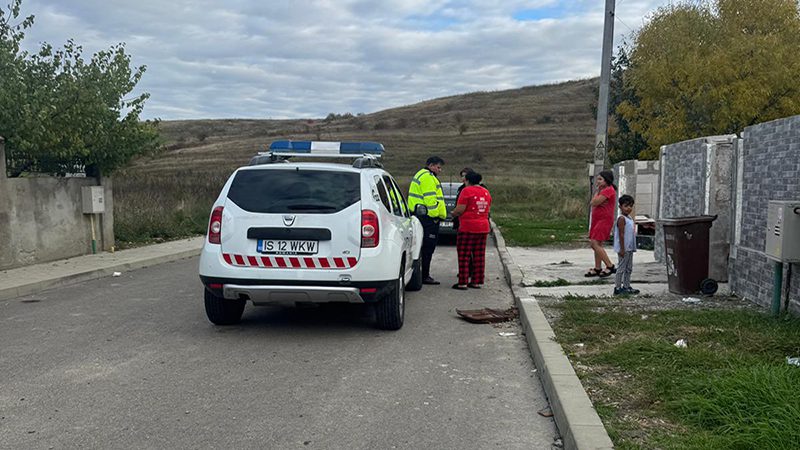
Small Victories in Impossible Circumstances
What happened next was its own small miracle. The rescuer already had another female dog at her shelter who had recently had puppies. When the new mother and her puppies arrived, something unexpected happened. The resident mother accepted all the puppies as her own. The two mothers got along well, settling into a peaceful coexistence that made the impossible overcrowding just slightly more manageable.
It wasn’t a perfect solution. The shelter was still beyond capacity. Space was still desperately tight. But the dogs were safe, fed, and no longer under threat of being killed to make a point.
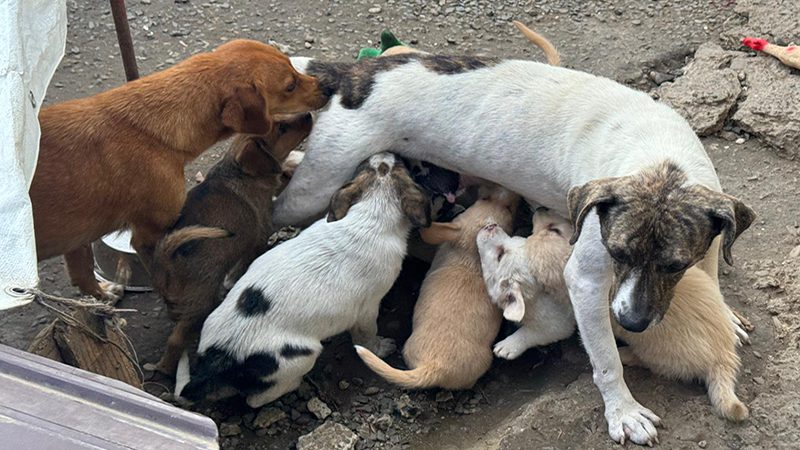
The Reality Behind the Rescue
This is what animal rescue looks like in the small towns and villages across Romania. It’s not always heartwarming stories of grateful families surrendering beloved pets they can no longer care for. Sometimes it’s navigating threats and pressure. Sometimes it’s being alone and scared, but doing it anyway. Sometimes it’s calling the police to protect yourself while you protect animals.
Small rescue operations like the one in Târgu Frumos face these situations with alarming frequency. They’re asked to do the impossible with limited resources, and when they can’t, they face consequences that range from guilt and pressure to outright threats.
ROLDA supports these small rescues precisely because of moments like this. Because when a rescuer is backed into a corner, trying to do the right thing with no space and no resources, they shouldn’t have to face it completely alone. The food, medical supplies, and support we can provide don’t solve every problem, but they make the impossible slightly less impossible.
The mother dogs and their puppies are safe now. They’re eating well, the puppies are growing, and the two mothers are sharing the responsibility of caring for all their babies. It’s a happy ending that almost didn’t happen. If you are a ROLDA supporter, you helped make this happen.
Story is from The Great Catsby – A ROLDA-funded local cat rescue partner
The woman who reached out to us didn’t know what else to do. For weeks, she had been watching them. A small brown cat and her two tiny kittens were surviving in the grubby, desolate gap between apartment buildings, where no one claimed responsibility for their existence.
Each day, she brought what food she could, watching as winter crept closer with its promise of frost and snow. Each night, she worried whether they would still be there in the morning.
When she finally contacted us, her message was simple but weighted with urgency: “I don’t know what to do with them. The cold season will surely mean the end for all of them.”
She was right, of course. The streets show no mercy to small cats when winter arrives. But winter would have been only one of many dangers. Traffic, disease, predators, starvation – the threats are endless for animals unlucky enough to be born or abandoned in the narrow spaces between buildings, where they exist as nobody’s problem.
A Fragile Agreement
We faced our own impossible mathematics. Our shelter was already beyond capacity. There wasn’t space for even a needle, as we say, let alone three more cats. But turning away wasn’t an option either. So, we proposed an agreement: we would provide all the medical care this little family needed, but they would need to remain in foster care with the woman who had contacted us.
It was a fragile arrangement, dependent on trust and commitment from both sides. Fortunately, it held.
The mother cat, who got named Brownie, arrived with her two kittens, a boy and a girl who would soon be called Mic and Gina. At first glance, they seemed like any other street cats: thin, wary, and carrying that particular tension that comes from constant vigilance. But of course, perfectly healthy cats straight from the street are rare. Very rare.
Peeling Back the Layers
The first veterinary consultation revealed what we had expected: respiratory virus symptoms in all three, accompanied by the usual parasites that plague street cats. They needed deworming, FIV/FeLV testing, triple viral testing; the standard protocol that helps us understand what we’re really dealing with.
Up to this point, nothing was particularly unusual. They all received their initial treatments. But Mum Brownie’s overall condition was concerning enough to the veterinarians that they recommended she stay hospitalised. It wasn’t just one thing – it was the cumulative weight of everything she had endured. Her body told the story of her life on the streets and motherhood in ways that broke our hearts.
There was another challenge, too: Brownie was terrified. This wasn’t a cat who allowed herself to be handled, or even touched. Years of survival had taught her that humans meant danger, and she wasn’t ready to unlearn that lesson. We understood, though. We know that what these cats need most isn’t just food and medicine. It’s the chance to finally feel the safety of a home, hear a gentle voice, and see a look that shows something other than contempt or threat.
The Discovery
The truly frightening moment came during Brownie’s spay surgery. Under sedation, she could finally be properly examined, and that’s when the veterinarian discovered something that made everyone’s breath catch – a growth under her tongue.
The possibilities raced through our minds, most of them dark. There was a high chance this could be a tumor, potentially malignant cancer. For a street cat who had already survived so much, the cruelty of this discovery felt overwhelming.
Tissue samples were taken immediately and sent to the laboratory for histopathological analysis. Then came the waiting. Two weeks that felt like months, where every possible outcome played through our minds. Brownie, of course, knew nothing of our anxiety. She simply continued being herself: frightened, defensive, but fighting to survive in the only way she knew how.
The Weight of Relief
When the results finally arrived, we felt a wave of relief so profound it left us hi-fiving and grateful all day. The growth was not neoplastic. Not cancer. Brownie had been lucky once again.
But luck is relative, and the news wasn’t entirely good. The laboratory suggested it was an autoimmune reaction that had led to the formation of an oral pyogenic granuloma, also called a hemangiomatous granuloma. It was a mouthful of medical terminology that essentially meant Brownie’s own immune system had turned against her, creating this problematic growth.
The recommended treatment was surgical removal, but when the veterinarians assessed the location, they delivered more difficult news. The growth was positioned in such a way that removing it with clean margins would be nearly impossible without risking damage to the tongue’s supporting structure. In their words, attempting surgery could literally cause her tongue to tear.
No one wanted to take that risk.
Instead, following the doctors’ advice, we chose a different path: medium to long-term corticosteroid treatment. It wasn’t our first choice. Corticosteroids have their own complications, but in this case, they offered the best chance to reduce the lesion’s size and keep it under control. The veterinarians also mentioned the possibility of laser therapy, which might help. It was something we would evaluate once Brownie was more stable and settled.
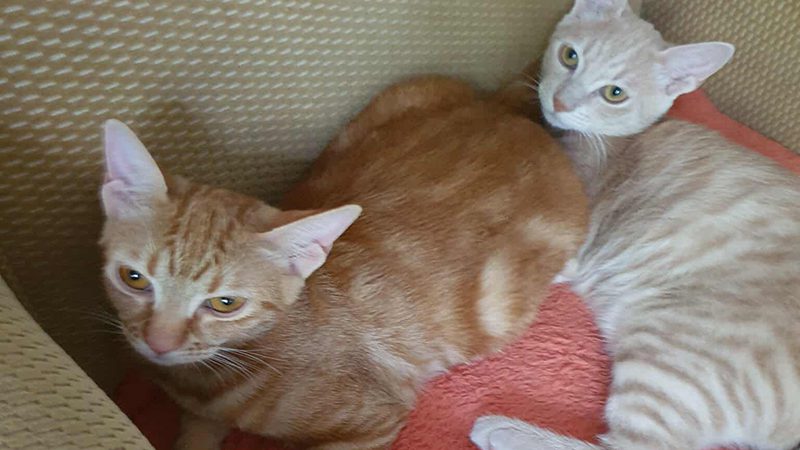
The Long Road of Small Victories
With her immediate medical crisis addressed, Brownie was finally discharged and reunited with her kittens in foster care. Watching them together was like witnessing a small miracle. Despite everything she had been through – the streets, the illness, the hospitalisation, the fear – Brownie remained devoted to her Mic and Gina. Her maternal instinct had survived when so many other things had been worn away.
The kittens themselves were facing their own battles. They needed to complete their vaccination course, but first they had to overcome a persistent combination of herpesvirus, stubborn parasites, and Giardia. It was another reminder of just how much street cats carry – layers upon layers of illness and infection, each needing its own treatment, its own timeline.
Mic, despite his name meaning “Small” in Romanian, was already showing signs that he wouldn’t stay small for long. His foster mother joked that he would grow into a “big Small,” and watching his appetite and energy, we believed it. Gina was more reserved, but she, too, was gaining strength daily.
And Brownie? Slowly, cautiously, she was beginning to change.
She still wouldn’t let herself be touched. That bridge was still too far to cross. But she had started coming out of her hiding spots when her foster mother was in the room. She showed herself, watched from a distance, and most encouragingly, she had developed what her foster mother called a “glorious appetite.” This wasn’t just good for Brownie’s recovery; it was the key to getting her medication into her, hidden in the food she now eagerly consumed.
These were small victories, perhaps, but in the context of a cat who had spent her entire life frightened and defensive, each one represented a monumental shift. The fact that she felt safe enough to emerge, to eat openly, to exist in the presence of a human without cowering; these were transformations worth celebrating.
What Street Life Leaves Behind
Brownie’s story illustrates something we see repeatedly in our work: the sheer scale of issues that stray animals must navigate just to survive. Across Romania, thousands upon thousands of cats and dogs live this same precarious existence, invisible to most people who pass them daily. It’s never just one thing. It’s always a cascade of interconnected problems, each one making the others worse.
A respiratory virus weakens the immune system, making cats more susceptible to parasites. Parasites drain nutrients that should be used to fight infections. Constant stress from living on the streets triggers autoimmune responses like Brownie’s. The lack of proper nutrition means wounds don’t heal, illnesses linger, and bodies wear out far too soon. And underlying it all is the psychological trauma—the fear, the constant vigilance, the learned mistrust of humans who might kick or throw things or chase them away.
When we take in a street cat, we’re not just treating one problem. We’re unravelling years of accumulated damage, addressing layers of need that go far beyond the obvious. It requires patience, resources, expertise, and time; so much time. There are no quick fixes for animals like Brownie. The veterinary consultations, the laboratory tests, the medications, the follow-up care, and the foster home where she can finally rest. All of these pieces must come together to give her a real chance at recovery.
This is only possible because of the compassion of people who understand that every life matters, even the small brown cat living between apartment buildings. The supporters who believe, as we do, that no animal should have to face the accumulated weight of street life alone. Their generosity transforms what would be an impossible task into something achievable, one cat at a time.
A Life Worth Living
Now, settled in foster care with her kittens safe beside her, Brownie has something she’s never had before: time. Time to heal. Time to learn that not all humans mean harm. Time to discover that the world can offer more than hunger, cold, and fear.
Her kittens, Mic and Gina, will have an even better gift—they’ll grow up never knowing the full harshness their mother endured. They’ll learn early that humans can be kind, that food comes regularly, and that warmth is constant. When they’re ready, we hope to find them families as wonderful as they are. And perhaps, with more time and patience, we’ll be able to set a similar goal for Brownie.
For now, we’re taking every small victory as it comes. Brownie emerges from her hiding spot more and more often to watch her foster mother. The way she runs to her food bowl, no longer cautious about showing hunger. The fact that she and her babies are safe, receiving the medical care they need, and knowing something other than survival mode.
Their lives are completely changed now. This is what life should be. Not just endurance, but something truly worth living. A mother cat who can raise her kittens without constant fear. Kittens who can play and grow without fighting for every meal. Small moments of peace that, to them, must feel like miracles.
In the photos from their foster home, you can see the transformation beginning. Brownie’s eyes, while still wary, have lost some of their desperate edge. The kittens tumble over each other with the careless joy of children who feel safe. And in those images, in those small daily victories, we see why this work matters, why people like you choose to care about animals they’ve never met, living in places they may never visit.
Because every cat like Brownie carries the weight of the streets with them. Every mother fighting to keep her babies alive deserves the chance to finally rest. And every small life saved reminds us that compassion, patience, and refusing to give up can truly change everything.
Brownie’s journey is far from over, but she’s no longer walking it alone. She has her foster mother’s quiet presence, her kittens’ warmth beside her, and the support of people who believe her life has value. That combination of individual dedication and collective compassion makes stories like Brownie’s possible. It’s what allows us to say yes when someone reaches out about a frightened cat and her babies facing winter. It’s what enables us to provide weeks of hospitalisation, expensive diagnostic tests, ongoing medication, and the patience required to help a traumatised animal learn to trust again.
And that, perhaps, is how people coming together to help makes all the difference.
Do you have any leftover currency from your holidays? We would love it if you donated it to ROLDA USA.
We have partnered with Global Coin Solutions, who turn the currency you no longer need into $$$ to help us rescue and rehome dogs from Romania & war-torn Ukraine.
Drawers or Jam jars filled with foreign coins gathering dust? Please dig them out and donate them to help ROLDA USA continue to help so many dogs that are injured, abused & starving find kindness, warmth and food.
How It Works
Have leftover foreign coins or bills? Turn them into lifesaving support for animals in need!
It’s easy:
● Gather any foreign currency you have tucked away in drawers, suitcases, or old travel bags.
● Mail it directly to our processing partner.
● Or, become a community host by placing a collection bin at your school, business, church, or club, and invite others to donate their unused travel currency too!
Your participation not only supports ROLDA’s rescue work, but also helps keep foreign currency out of landfills. A small action with a big impact.
How To Donate Your Foreign Currency
Via Mail:
Attn: ROLDA-USA C/O GCS
4450 Witmer Industrial Estates, Unit #4
Niagara Falls, NY 14305
(Don’t worry — sending it by mail is safe. The currency has no value until it is professionally repatriated.)
Getting on a plane and driving across a country could feel like an arduous task at hand but given the bigger picture at play, I knew this was going to be a special one. Last week, I flew out to meet the dogs and cats at our shelter in Galati, Romania and was truly touched by the incredible souls I met – animals and humans alike.
Meeting the dogs at our shelter in Romania was about them – learning about their personalities, understanding what they’ve been through and hoping it would help bring them one step closer to their forever homes. As we grow our adoption programme in the UK, we want to offer these dogs the best chance they can and to be able to go to Romania and get to know each dog means we are one step ahead when choosing the type of home and family that will best suit their personalities and individual needs.
It is hard to miss the strays that litter the streets in Romania, it is part and parcel of moving around the country. Some dogs are settled street dogs and are looked after by kind people who go out of their way to feed them and offer kindness. However, it’d be dishonest to not mention that they can still be under some threat by those who are not part of the “dog loving” community – meaning most are left uncared for with little help. Some discarded after being used as hunting dogs or guard dogs, some, despite being owned, neglected medically and in very poor condition and others simply having litter after litter, adding more pups to the stray dog population. That’s what spurs us all on to do the job we do at ROLDA.
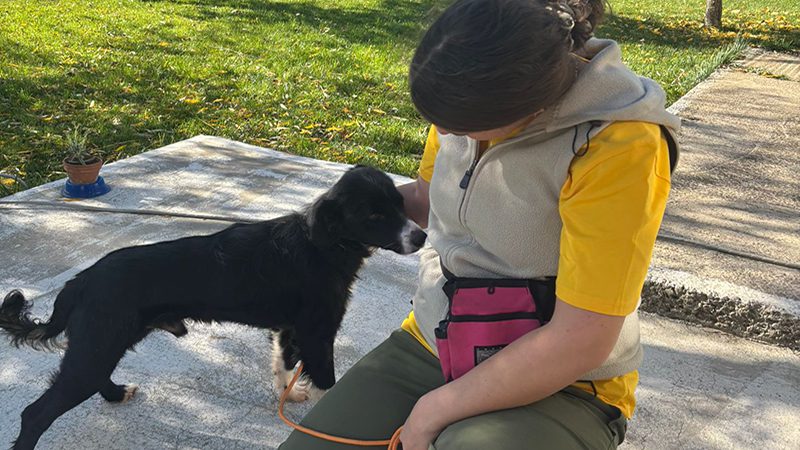
It is safe to say the dogs who have landed and found themselves in the shelter in Galati are in incredible hands, and I certainly felt no different. The team who run our small shelter welcomed me with open arms and are the tiniest team of two ladies called Flori and Aurelia – who love each animal as their own. They work hard, day in day out ensuring each cat and dog have what they need, whether that’s as simple as their daily meal or administering medication or relentlessly aiming to walk each dog and socialise them in the local village. And what was most special to see? The way these ladies adore each animal and shower them with love that is kind and gentle.
Throughout my time in the shelter, I played with, trained and assisted with preparing the dogs for adoption. This consisted of spending time with each one, recording their weight and measurements and observing their personalities. Time and time again each dog showed me their uniqueness, willingness to learn, openness to love – despite maybe having not known it before. Most incredibly, even if they were nervous to meet someone new, they had a desperation to trust, to try as hard as they could to experience the kindness that was on offer to them if they wanted to take it. It is this resilience that dogs embody that amazes me every time I work with rescues and I believe it is no doubt down to the kindness that is shown to them at the shelter.
I also got to spend time with Dana – who is the driving force behind all of ROLDA’s efforts – globally! Dana is a selfless woman, striving to make a difference in every unfortunate animal’s life, no matter where they come from, what they’ve been through and how they are today. I felt truly lucky to be on her team and part of the charity’s mission to bring hope to every animal and globally make lasting change to animals’ lives in Romania and beyond.
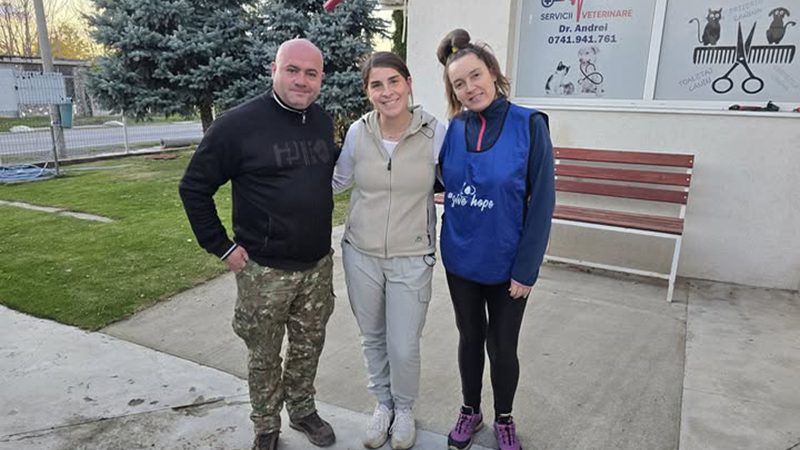
With a force of nature such as Dana, a team that are dedicated every minute of the day such as Aurelia and Flori and dogs and cats that are truly some of the most special souls I have met, the future for ROLDA is going to go from strength to strength. I got to see the land where the Pawz Up center will be – a sanctuary that is going to offer so much promise and will be groundbreaking for the lives of so many animals and the conversations we had about how plans for the future are going to encapsulate the best intentions of every animal’s welfare was truly exciting to be a part of. ROLDA’s mission goes above and beyond what overseas rescuing has ever done before and means we are one step closer to changing the stigma of animals being “just a stray” or “another overseas rescue”. I feel privileged and lucky to see how we grow and hope you will join us on that journey.
When the young dog arrived at a ROLDA Rescue Team Ukraine shelter, she wasn’t bleeding. There were no obvious wounds, no visible signs of trauma that would make someone stop and say, “This animal needs urgent help.”
But our experienced veterinary team knew better.
She was lethargic, her eyes dull with exhaustion. Her body was wasting away despite attempts to feed her. Severe diarrhea and vomiting had left her dangerously dehydrated. What appeared to be general weakness was actually something far more serious: enteritis, a potentially deadly inflammation of the intestines.
For dogs already weakened by life on the streets—malnourished, unvaccinated, fighting just to survive—enteritis doesn’t need long to become a death sentence.
The Disease That Hides in Plain Sight
Enteritis attacks the lining of the small intestine, destroying the body’s ability to absorb nutrients and fluids. What follows is a devastating spiral: exhaustion, rapid weight loss, dehydration, and in severe cases—especially among puppies—death.
The causes vary. Viruses, bacteria, parasites, contaminated food or water—any of these can trigger the inflammation. In overcrowded conditions where sanitation is difficult to maintain, a single infected dog can transmit it to others, creating a chain reaction that can devastate an entire shelter.
When War Makes Everything Harder
In Ukraine, the challenges have intensified. Medical supplies are scarce. Veterinary resources are stretched impossibly thin. Volunteer teams work around the clock but are overwhelmed by the sheer number of animals arriving—frightened, injured, malnourished, and often carrying diseases that went untreated on the streets.
In these circumstances, enteritis can go unnoticed, mistaken for simple malnutrition or general weakness until it’s far too late. By the time symptoms become impossible to ignore, the dog may already be in critical condition.
The war has created the perfect conditions for enteritis to spread: high numbers of stray dogs, limited access to veterinary care, overcrowded temporary shelters, and the constant struggle to maintain proper sanitation when resources are scarce.
Breaking the Chain
Here’s what gives us hope: enteritis is treatable when caught early.
With proper care—vaccinations, deworming, parasite control, clean environments, and quick intervention at the first signs of illness—we can stop this invisible killer before it takes hold. In our shelters, consistent preventive care has saved countless lives that otherwise would have been lost to this devastating disease.
But prevention requires resources. Vaccines. Clean water. Proper food. Veterinary attention. Space to isolate sick animals before they infect others.
Every Dog Deserves a Fighting Chance
That young dog who arrived weak and fading? With early detection and treatment, she survived. She’s one of the lucky ones—but only because the resources were available when she needed them most.
Right now, more dogs are arriving every day, facing the same battle. Your support ensures we can provide the preventive care and early treatment that makes the difference between life and death.
Support our veterinary care fund to help us continue protecting vulnerable dogs from enteritis and other preventable diseases. Because the dogs who survive war, abandonment, and starvation shouldn’t lose their lives to a disease we know how to treat.
The shack was barely standing—four broken walls and a collapsing roof on the outskirts of Tulcea. Inside, curled into the darkest corner, was Mira.
A tourist passing through spotted movement in the ruins and knew immediately something was wrong. They contacted a local man, who didn’t hesitate to reach out to our partners at The Great Catsby. When the rescue team arrived and finally coaxed the terrified cat into the light, what they saw stopped them in their tracks.
Mira was missing half of her hind leg. A horrifying wound had consumed most of her nose. Her body was so frail, so small, that rescuers assumed they were looking at a kitten. Only later would the vet confirm the heartbreaking truth: Mira was around three years old. Starvation and suffering had stolen her size, her strength, and nearly her life.
She was rushed straight to the clinic. Blood tests. Deworming. Emergency neutering. A tissue sample from her nose was sent to the lab—the vet fears it may be cancer. Now we wait for results, holding onto hope while preparing for whatever comes next.
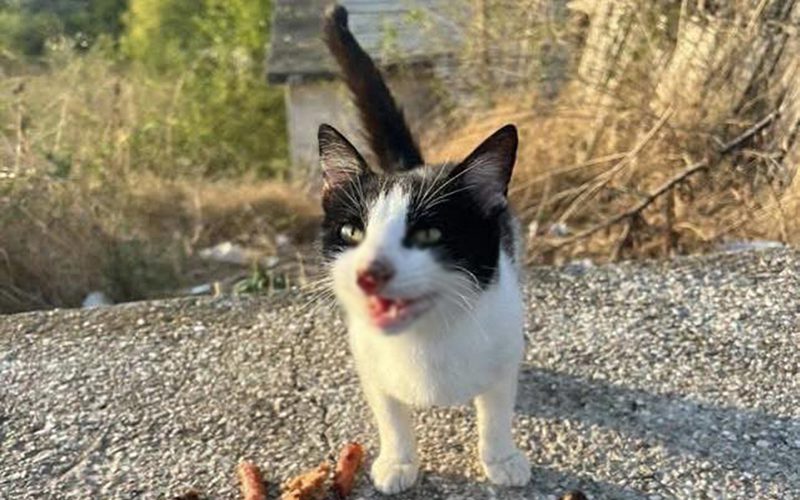
When Trust Returns
Despite everything she has endured—the abandonment, the pain, the terror of surviving alone—Mira is showing quiet signs of strength. She has begun to eat again. She accepts gentle touch from the team caring for her.
Every small gesture of trust feels like a miracle.
The Reality Beyond One Cat
Mira’s story could have ended in that broken shack, her suffering invisible to the world. But every day across Romania, countless cats and dogs face this same cruel reality: abandoned, injured, left to survive or die alone.
ROLDA and our like-minded animal rescue partners refuse to accept that this is simply how things must be. With every rescue, every surgery, every animal given safety and care, we are rewriting stories that once seemed destined to end in silence.
Mira now has what she was denied for so long—a fighting chance. A chance to heal, to trust again, to discover that life can offer more than pain and fear.
Will you help us give this chance to the next Mira?
Your support ensures that when we receive that call about an animal in desperate need, we can answer with action instead of apologies.
 non-US support +44 (0)161 531 8801
non-US support +44 (0)161 531 8801


